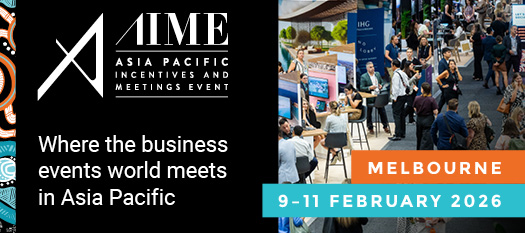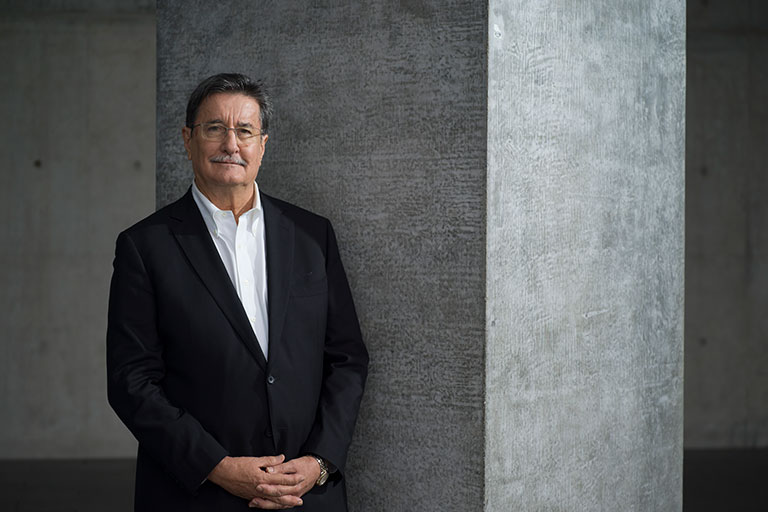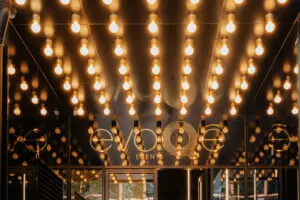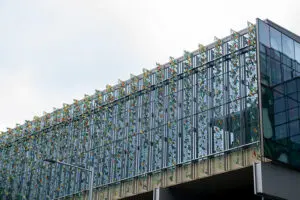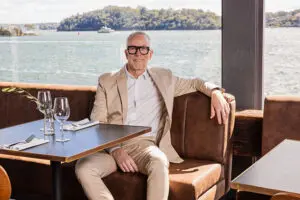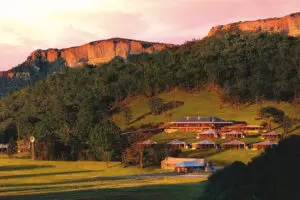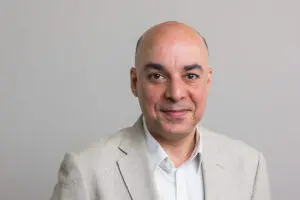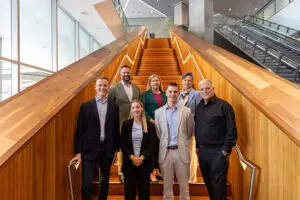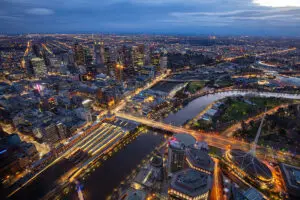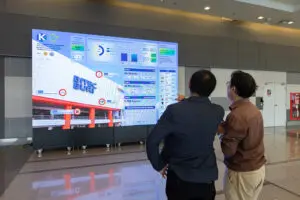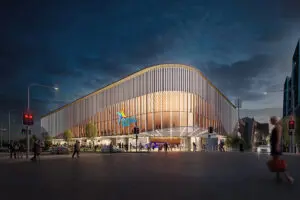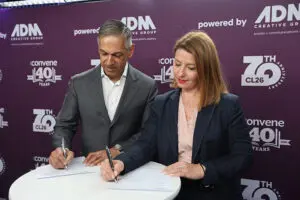We covered wisdom from American president Harry Truman, physicist Albert Einstein and tennis great Billie Jean King as well as Donaghy’s own philosophies on leadership, from clarity of purpose to the strength of kindness. We discussed challenges and opportunities for the industry and the turning points in the business events sector over the three decades he has been one of its leaders.
Raised in Far North Queensland, Donaghy started out professionally in teaching. Even as a young teacher, he appeared to be on an accelerated path, working in a one-teacher school out in the bush much earlier than most. He also worked in a First Nations community and at a school for children with special needs, which became the highlight of his teaching career.
Then he took a one-year break to follow the sun and his time in the visitor economy began – with him washing dishes in a restaurant in Cairns. He moved on to working the counter at Trans Australia Airlines (TAA), before moving into the airline’s holiday travel division and then being asked to head up sales for the first internationally branded hotel in the region – the Ramada Reef Resort in Palm Cove.
“I’ve never really had a planned next move in anything I’ve done,” says Donaghy.
“It’s a bit sort of contrary to the advice that I give people or the advice that people get.
“But I’ve always worked on the basis … that the best career strategy is just do the very, very best job in the job you’re in and keep your eyes open.”
When Donaghy joined the visitor industry in Cairns, he says the destination was in its boom time. Cairns had recently got an international airport and the Great Barrier Reef had been World Heritage listed about five years before Donaghy joined Ramada, giving Cairns a greater international profile. Donaghy would later be involved in the World Heritage listing of the Wet Tropics rainforest.
“It was a very, very exciting time in tourism in Cairns – it had an emerging cruise industry, it had an international airport just opening, so it was really a petri dish of every sort of issue and development issue in the tourism industry.”
Through his hotel role, Donaghy came to sit on the board of Tourism Tropical North Queensland (TTNQ) and it was when the organisation was looking for a new manager that he realised he wanted the job.
“We’d done a number of interviews – the more interviews I did, the more I realised what those sort of organisations could do.”
As general manager of TTNQ, Donaghy had two major light bulb moments – one would lead him into the business events industry and the other became a core pillar of his leadership philosophy and has filtered down into his teams over the last 30 years.
“I realised that successful cities invariably had a broad based visitor industry, not just single or single digit visitor segments, but a very broad based visitor industry and invariably successful cities had a successful convention and exhibition component – a significant component of that,” he says.
“Not just because of the high yield of those delegates but because of what became, much, much later on, the beyond tourism benefits – the knowledge economy benefits that [come with bringing] in the best operators in any business or any profession or any pursuit of education [or] research, into your city for four or five or six days and that mutual benefit of having the local cohort exposed to what Cairns and [the] Tropical North had to offer.
“And to do that you really needed a purpose-built convention and exhibition centre.”
With Cairns up for a potential casino licence at this time, Donaghy lobbied for the funds gained from the granting of the licence to be used to build a convention centre in the town.
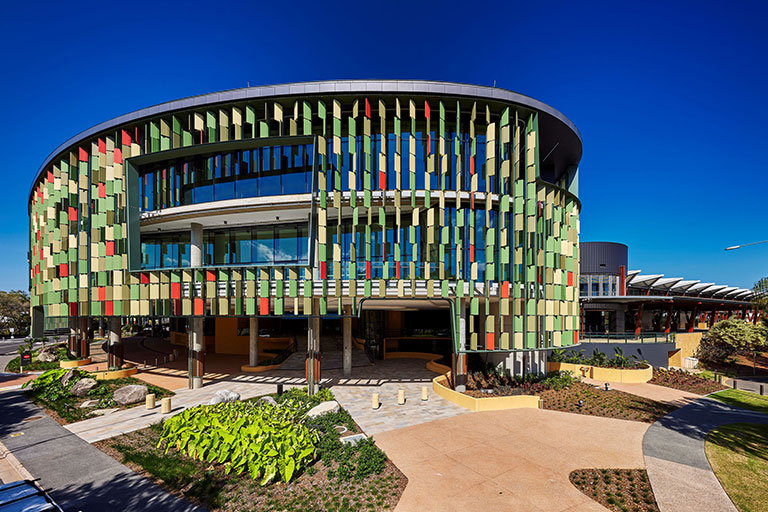
It was during his time as a young manager of TTNQ that he also had an epiphany about leadership.
“It sort of hit me like a revelation that from that day on everything I was going to be judged on had to be delivered by other people, not by me. So, I was responsible for people, and I was responsible for outcomes, but I didn’t do those things, other people had to do them – the team that I had the privilege of leading had to do them.
“That made me realise that it was all about people and … for me leadership wasn’t something you did … it was the outcome of what you do.
“So, I just concentrated on three things.
“Do what’s needed. What people need is not always what they want so you’ve got to do what’s needed for the company, what’s needed for the organisation. You’ve got to do what’s right, obviously legally and by the company’s purpose … but you’ve also got to do what’s right by your moral compass. You know if what you’re doing is not right, so you’ve got to do what’s right. And the third part … is doing it together, is to always take people with you.”
While at TTNQ, Donaghy was on the board of the Queensland Events Corporation, where he met Harvey Lister, now chair and CEO of ASM Global in APAC. Back then, Lister had relatively recently started the business that would become AEG Ogden and eventually part of ASM Global.
“I liked him from the start,” said Lister of Donaghy.
“He had this dry, wicked sense of humour.
“We had been engaged to do a needs analysis and a feasibility study on whether Cairns needed a convention centre and was it sustainable. So, I had a lot of interface with Geoff in that role.”
And when AEG Ogden won the contract to manage the centre, Donaghy was the first one Lister called.
“I said to him I need you and he came across and we’ve had a wonderful career together.”
Donaghy was at the helm of the Cairns Convention Centre when it opened in 1996 and headed up the convention centre for nine years, including during its two-year pre-opening period. The venue was independently judged as the world’s best convention centre in the AIPC Apex Award twice – once in 2004 and later in 2014, after Donaghy departed the venue headed for Brisbane to lead another in the AEG Ogden portfolio, Suncorp Stadium. He later became the president of AIPC, the global convention centre association. He was also chair of the Business Events Council of Australia between 2005 and 2010 and deputy chair between 2018 and 2021.
“Everybody knows Geoff Donaghy,” says Lister.
“I don’t think the industry in Australia necessarily recognise what a big statement he made on the AIPC.
“We are so lucky to have him as part of our organisation; we are so lucky to have had him in this venue and in Australia, but the rest of the world got him as well.”
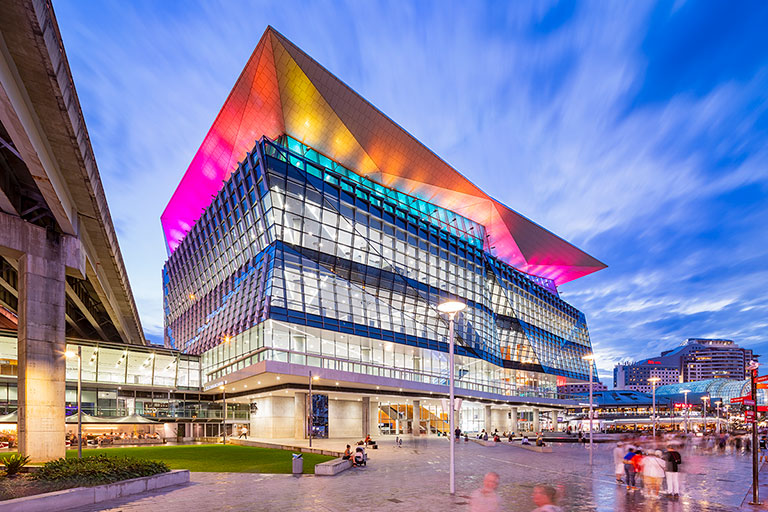
As group director of convention centres for AEG Ogden – and now ASM Global in APAC – Donaghy helped the company secure the management of ICC Sydney and took on the position of the centre’s CEO in 2014 ahead of its 2016 opening.
Donaghy says ICC Sydney was a chance to do something “a little bit differently” embracing both the venue’s role as a piece of economic infrastructure and a piece of social infrastructure.
Observing the connections that ICC Sydney facilitated by bringing together professional communities remains profound for Donaghy.
“Standing in the foyer of our early international events – things like SIBOS, which took over the whole facility…just sitting back and watching delegates from all around the world walk in and the look of anticipation and excitement on their faces, the look of awe when they came into the building, but more importantly the meeting and greeting and the camaraderie of people from all around the world who are meeting up as they probably do, just once a year or maybe twice a year, and that professional and personal camaraderie that exists in a convention and also an exhibition.”
SIBOS was one of the centre’s first very large events – the conference and exhibition for the finance industry brought 7,500 people to Sydney from 150 countries. The event contributed $40 million to Australia’s economy and gave Australian universities and startups a global platform at home. Through a partnership with OzHarvest, the event also saw 855kg of food donated to those in need.
Over Donaghy’s time leading ICC Sydney, the convention centre has injected nearly $4 billion into the Australian economy, while maintaining an average of 97 and 98 per cent satisfaction ratings for delegates and clients respectively. The centre also has an industry leading legacy program – the only one of its kind in Australia and New Zealand.
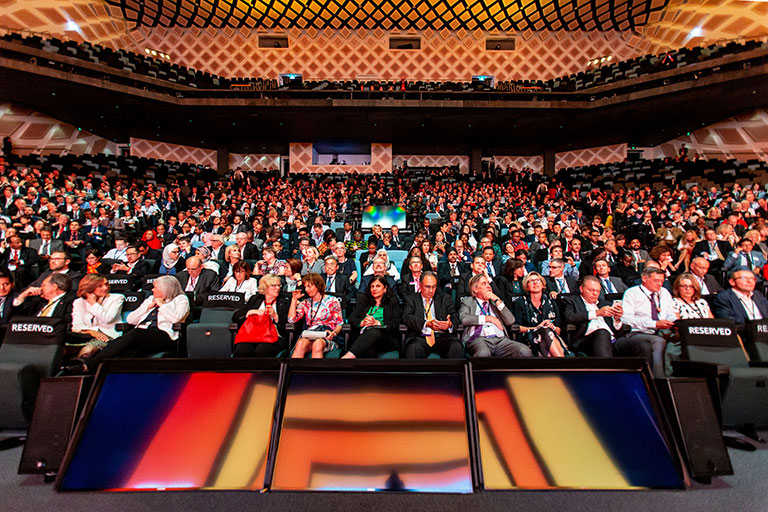
Digging into the wisdom and the thinking that has guided Donaghy’s career provides a glimpse of perhaps why the venue has been so successful – especially when not all convention centres reach these heights.
There are quotes from President Truman, Albert Einstein and Billie Jean King that have shaped his approach – and they’re evident in the way the centre operates.
From Truman: “It is amazing what you can accomplish if you do not care who gets the credit.”
“There’s no such thing as a successful convention centre, there’s only successful clients,” says Donaghy.
“We’ve got to train a hundred per cent of our focus and our thoughts and our care and compassion to making our clients successful, ipso facto we’re going to be successful.
“There’s no such thing as a successful department, because everyone fails together, everyone succeeds together.”
From Einstein: “If you can’t explain it simply, you don’t understand it well enough.”
“Having made the point you want to get across, don’t belabour it, because then you’ll diminish it,” says Donaghy.
And from King: “Pressure is a privilege.”
“We’re in this position to do something about … challenges, so you should never see pressure as an impost, you should always see pressure as a privilege,” he says.
Donaghy also has his own five c’s which guide his leadership practices and those of his executive team – clarity of purpose, collaboration – doing it together – consistency, confidence and calm – which became especially important during the pandemic, because, as he says, “if we’re running around like chooks with our heads cut off and panicking, that’s going to create a terrible atmosphere and aura in the team” – and finally, compassion, which he believes is a strength.
He also believes change is constant and you can’t predict or prepare for crises like the pandemic.
“People assume that the conditions they’re in are going to be the conditions they’ll always be in – whether they’re adverse conditions or whether they’re peak conditions. You should never assume that’s the conditions you’ll always be in.
“Two certain things about crises – one is they finish; the other certain thing is you don’t know when.
“Don’t even think about predicting them. You can’t plan for them. All you have to be is ready to respond to them, whatever they are. To be as agile as possible and that’s what we endeavoured to do here at ICC Sydney.”
During the pandemic that meant leaning into the expertise they had, which led to the creation of ICC Sydney’s virtual studios and to making jam from the excess fruit of some of the farmers who supply the venue. It meant keeping on as many staff as possible so that they would be ready for the bounce back, when it eventually came.
“We had the best looking storerooms and warehouses in the business in the city because people swung to doing those things. We found roles for them.”
It also meant having team members from all kinds of departments working in event operations roles when the return to business came in an unexpected flood.
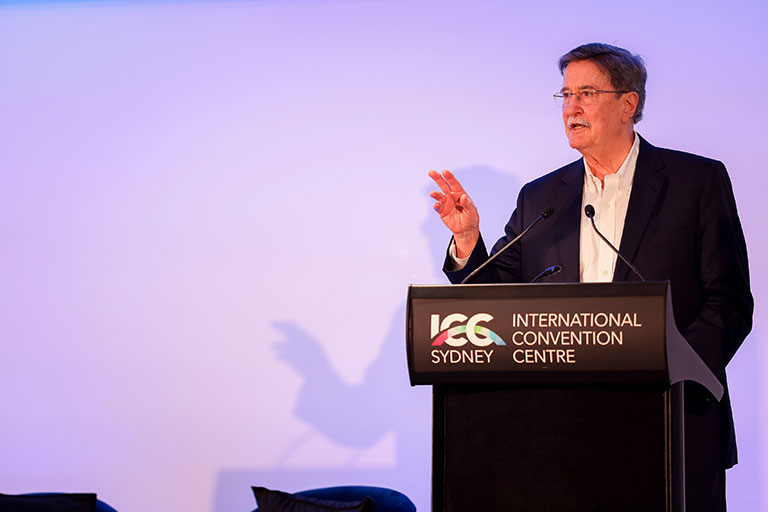
Donaghy has seen his fair share of industry turning points during his career given he’s been in the events business for around half the time the industry has existed, even as an inkling, in Australia.
Major turning points for him have been the birth of the term business events, which was coined in Australia and has spread across the world, the move to considering the beyond tourism benefits of conferences, exhibitions and other events and the importance of case studies to demonstrate the impact and value of business events. The pandemic was also a turning point.
“There’s nothing that brings the contribution into drastic, highlighted attention than its absence – even if it’s just the straight financial contribution, notwithstanding the other associated benefits,” he says.
Talk of the pandemic also brings us to a couple of issues that the industry has been consistently wrestling with – the tendency for business events to be conflated with tourism and a perceived lack of government support for the industry, which felt especially acute during the pandemic.
Donaghy’s experience shows in his perspective on these issues – the complexity of our industry means we sit in a grey area.
“There was a move to say, let’s try and distance ourselves from tourism, that we weren’t part of the tourism industry, which we tended to get lumped into.
“The politician that we call on in any advocacy role, to ask for support, ask for money, ask for investment, is invariably the tourism minister – the state tourism minister or the federal tourism minister – so to go to them and say, you’ve got to help us, but by the way, we’re not part of tourism, was a bit counterintuitive, wasn’t a good way to lobby.
“Certainly, we’re part of tourism, we create great benefits for hotels and restaurants and that sort of spending, but there’s a whole world of other benefits beyond that tourism stream as well.
“I sometimes bristle a bit in industry bodies when people mention that government doesn’t understand us, government doesn’t support us, and I do point out to people that if you actually tally it up, state governments collectively have probably invested, through various models … something like between five and six or seven billion dollars in major world class infrastructure and then have gone on to continue to invest in their city bureaus as well,” he says, while conceding that getting politicians to really understand the depth of what they’re investing in remains a challenge.
“That lobbying need is eternal,” says Donaghy.
“You get to a point where a minister, their advisors, their offices do [understand business events] – it can sometimes take a year or two of lobbying and briefing and getting them down to events – but then ministers change and [when] a minister changes, all of that intellectual knowledge that’s in their office goes with it.”
Before he swaps plenary spaces and exhibition halls for the greenery of the garden in Bowral, where he jokes he’s about to become the third or fourth assistant gardener, we talk challenges and opportunities for the industry.
Although we don’t call it this exactly, we touch on the tyranny of distance for Australia as a business events destination, with international events our biggest source of potential growth. Aside from the time and monetary cost of attending events in Australia for those from Europe and North America, the environmental cost of travel has become a factor for some organisations when choosing their conference destinations, although Donaghy has great faith in the work being done on biofuels and aircraft efficiency.
The ramping up of global competition is also a significant challenge, he believes.
“Now we’re also in absolutely intense competition with other cities and other countries…to get international business here.
“There are so many cities now that are investing highly significant amounts of money in infrastructure.
“Not only in infrastructure … but also the investment in subvention [has] never been stronger than it is now.”
Although it’s not really so for a business the size of ICC Sydney, Donaghy also acknowledges that recruitment and retention continue to be issues for the industry.
“And then there’s the eternal and perpetual one of being recognised by governments in the right way and with the right investment.
“And quite often the help they can give us is not necessarily direct and overt, it’s just removing barriers – you know, visa regulation, things like that. Both sides of the equation – it’s the positive support but it’s also the removal of negative barriers as well.
“We’re a complex industry so that makes it hard to present a cohesive message.”
For most of these challenges though, Donaghy believes there is a path towards a solution.
“[I’m] a great believer that … one voice, one message is critical and it’s incredibly important, but I’m also a great believer in one message, many voices. So, if we can have a whole lot of people in organisations…presenting a cohesive, collective message, that becomes a choir, not individual voices.
“And in this regard, it’s great to see the formation of the Australian Business Events Association which I personally and the team at ICC Sydney are very happy to support.
“We’ve got to start with a clear message internally. We’ve got to have some agreement on what the story is. But once again, one message, one story, many voices. That’s the great opportunity.
“I think the opportunity is to share the stories across generations, across senior people and new starters, to create that connection.
“Ultimately the opportunity is to share those stories. Everything comes down to stories eventually.”
And, Donaghy says, there’s an opportunity “to create the awareness of those career paths, that people can go from washing dishes to being a CEO”.



